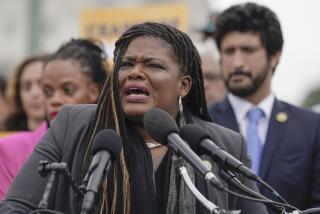Sharpton Joins Race for White House
- Share via
WASHINGTON — The Rev. Al Sharpton, a black political activist from New York City, jumped into the 2004 Democratic presidential contest Tuesday, hoping to appeal to large numbers of minority voters and gain national influence within the party.
Sharpton, seeking to claim a mantle of black leadership last worn by the Rev. Jesse Jackson during his two presidential runs in the 1980s, is likely to be taken seriously by his Democratic rivals, even if his chances of winning the nomination are remote.
In a telephone interview, Sharpton predicted he will energize voters dispirited by Democratic losses in the 2000 presidential and 2002 midterm elections.
His unabashed aim is to yank the party sharply to the left as it prepares to challenge President Bush.
“I am the only clear antiwar, anti-death penalty, anti-tax cut candidate who is in the race,” Sharpton said after filing papers to establish an exploratory committee for a presidential run.
He noted that he was the lone potential candidate to speak in Washington on Saturday at a major rally against a possible war in Iraq.
Sharpton, 48, joins a field of presidential hopefuls that includes three Democratic senators -- John F. Kerry of Massachusetts, Joseph I. Lieberman of Connecticut and John Edwards of North Carolina -- as well as former Vermont Gov. Howard Dean and Rep. Richard A. Gephardt of Missouri, the former House minority leader. In that group, only Dean has spoken against the resolution Congress approved last fall to authorize Bush to use military force against Iraq; the others all voted for it.
Of his rivals for the nomination, Sharpton said: “Many of them are to the right of Republicans, and they’ve been part of this move to the right. That has ruined the party. We have a bunch of elephants running around that are in donkey clothes.”
Others weighing runs for the Democratic nomination include Sen. Bob Graham of Florida, retired Gen. Wesley Clark of Arkansas, former Sen. Gary Hart of Colorado and former Sen. Carol Moseley-Braun of Illinois, who was the first black woman to serve in the Senate.
A fixture in New York politics for two decades, Sharpton has been an unsuccessful candidate twice for U.S. senator, in 1992 and 1994, and once for New York City mayor, in 1997.
But he has been extremely successful in getting his views heard -- often on matters of importance to racial and ethnic minority communities.
“He’s obviously a very bright guy with a lot of natural leadership instincts, to emerge in New York politics the way he has,” said Charlie Cook, a political analyst in Washington. “There are a lot of Jesse Jackson wannabes in this country, and he’s the closest one to becoming the new Jesse Jackson.”
But while analysts say Sharpton could win plenty of attention, he also has been trailed by some controversy.
Many voters outside New York know him best for his role in the racially charged Tawana Brawley case. Brawley, who is black, claimed in 1987 that she had been abducted and raped by a gang of white men. Her story gained national attention, but a grand jury found it to be a hoax.
Sharpton pushed to publicize Brawley’s story and was tarnished when it fell apart. But the new presidential contender denied that the case would affect his credibility with voters, observing that Bill Clinton shed more serious allegations of personal and ethical impropriety in 1992 to become the Democratic nominee and then president.
Offering a counterpoint to the Brawley affair, Sharpton noted that he had also taken on the cause of black and Latino defendants in the 1989 rape of a jogger in New York’s Central Park.
In that case, prosecutors recently concluded that they had charged the wrong people with the crime. Last month, a judge threw out the convictions of five men in the case after they had served prison terms of seven to 13 years.
Sharpton pledged as a candidate to speak for “the disaffected and the persons that have been marginalized in society -- blacks, Latinos, gays and lesbians and working-class whites.”
Sharpton argues that he can help Democrats defeat Bush.
“The margin of victory will be whether we can attract the disaffected,” Sharpton said. “Clearly, there’s no one [else] in the race who can appeal to that crowd.”
Others would dispute that contention, and it is by no means certain that Sharpton will attain the stature that Jackson achieved in 1984 and 1988.
More to Read
Get the L.A. Times Politics newsletter
Deeply reported insights into legislation, politics and policy from Sacramento, Washington and beyond. In your inbox twice per week.
You may occasionally receive promotional content from the Los Angeles Times.










